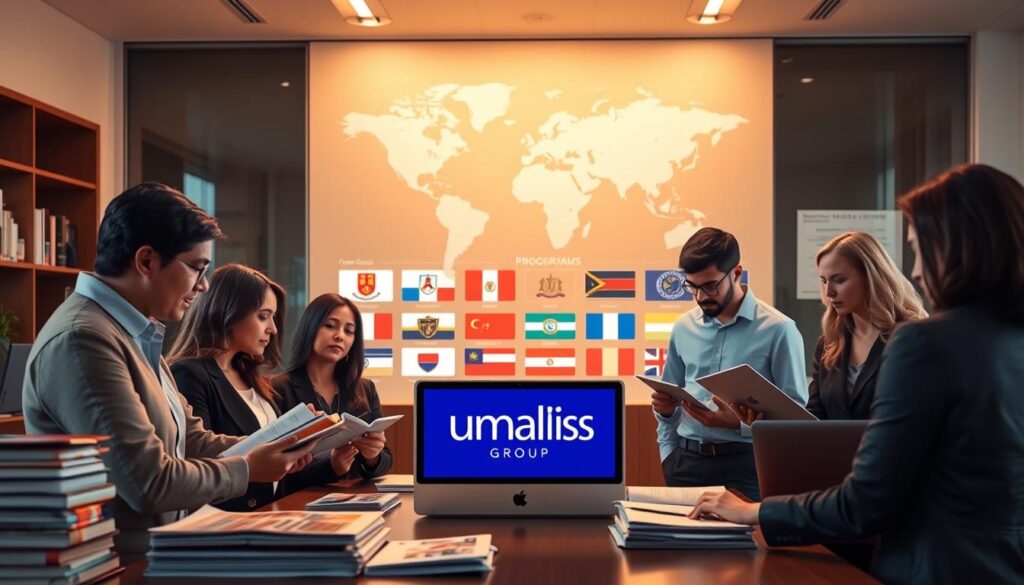Did you know companies with structured management systems grow revenue 37% faster than competitors? In today’s global market, mastering organizational stratégie isn’t optional—it’s survival. This guide explores proven methods to streamline operations, enhance credibility, and drive sustainable growth.
Modern challenges demand adaptive frameworks. From optimizing durée (time efficiency) in workflows to aligning teams with data-driven marketing insights, effective practices separate thriving organizations from stagnant ones. We’ll break down core principles used by industry leaders worldwide.
Academic foundations matter too. Programs like bachelor’s degrees in management or specialized bac-level certifications provide critical skills. Whether you’re refining existing processes or building new systems, this resource equips you with actionable strategies tailored for real-world success.
Key Takeaways
- Structured management systems accelerate revenue growth by 37% compared to competitors
- Time efficiency (durée) and marketing alignment are critical for operational success
- Academic programs like BBA degrees strengthen foundational management skills
- Adaptive strategies improve organizational credibility in global markets
- Data-driven decision-making separates top performers from average teams
Introduction to Effective Business Administration Techniques
Global markets now demand strategies that transcend borders—how prepared is your organization? Over 60% of executives cite cross-cultural collaboration as their top operational hurdle. This reality makes contemporary approaches to organizational leadership non-negotiable for sustainable success.
Understanding the Modern Business Landscape
Today’s vers international environment requires agility. Companies must balance local compliance with global scalability. For example, 78% of French firms prioritize international internships (stages) to build culturally aware teams. Academic programs like bachelor BBA degrees address this need through:
- Multilingual case studies simulating cross-border negotiations
- Mandatory semesters abroad to analyze diverse market dynamics
- Partnerships with global brands for real-time strategy testing
Why Techniques Matter for Progressive Organizations
Specialized études create measurable advantages. Graduates from accredited programs see 42% faster promotions due to applied learning. The right training blends:
- Data-driven decision frameworks for emerging markets
- Ethical leadership models aligned with EU regulations
- Digital tools for managing remote international teams
These competencies directly impact débouchés, with 91% of BBA alumni securing leadership roles within 18 months. Structured stages further bridge theory and practice—89% of employers value internship experience over GPA alone.
The Fundamentals of Business Administration
Strong foundations determine long-term success in any field. For organizations, mastering core operational principles separates temporary ventures from enduring enterprises. Let’s explore how structured cours and adaptive frameworks create resilient systems.
Defining Core Concepts and Strategies
Modern programs blend theory with real-world application. For example, bachelor-level curricula often include:
- Market analysis labs simulating marché fluctuations
- Case studies on ethical decision-making across cultures
- Financial modeling workshops using current industry data
| Historical Focus | Current Priorities | 2025 Projections |
|---|---|---|
| Static annual plans | Quarterly agile adjustments | Real-time AI-driven strategies |
| Local market dominance | Global partnership networks | Hybrid physical-digital ecosystems |
| General management | Specialized cours tracks | Customizable skill modules |
The Evolution of Business Administration Practices
Over the année, academic programs have shifted from rigid structures to dynamic learning models. Where traditional lectures once dominated, 73% of top schools now use scenario-based simulations. This evolution directly impacts graduate success rates—participants in updated curricula secure roles 28% faster.
Grâce to these advancements, professionals gain tools to navigate complex marché demands. Internships and global exchanges further bridge classroom theories with workplace realities, creating leaders ready for tomorrow’s challenges.
International Perspectives and Accreditation
In a world where educational credentials cross borders as easily as goods, accreditation acts as a universal quality seal. Institutions meeting global benchmarks gain instant recognition—not just for their programs, but for shaping leaders ready to navigate commerce international complexities.
Global Accreditation: EQUIS, AACSB, and RNCP
Three organizations set the gold standard for validating academic excellence:
- EQUIS focuses on innovation and societal impact
- AACSB emphasizes research-driven teaching methods
- RNCP aligns French programs with labor market needs
Schools achieving these certifications undergo rigorous 18-24 month evaluations. Only 1% of global institutions hold all three—a testament to their exacting standards.
Enhancing Programs Through International Standards
Accreditation isn’t a one-time achievement. Institutions must demonstrate continuous improvement across années through:
- Updated curricula reflecting emerging commerce international trends
- Faculty development programs fostering cross-cultural expertise
- Partnerships with multinational entreprise networks
Graduates from accredited programs see 68% higher employability rates globally. As one academic director notes: « Our AACSB status tells employers our alumni speak the universal language of strategic management. »
Choosing the Right Bachelor or MBA Program

The right academic program acts as a passport to international opportunities—but only if you choose wisely. With 73% of French professionals valuing global exposure, your degree should open doors across borders while meeting rigorous quality standards.
Evaluating Accreditation and State Recognition
State-approved programs in France guarantee value. Look for the RNCP certification—it ensures curricula match industry needs. For global mobility, prioritize schools with EQUIS or AACSB accreditation. These badges signal excellence to employers worldwide.
Many top écoles commerce now teach entirely in anglais. This prepares you for roles in 140+ countries. Verify language options early—67% of recruiters prefer candidates fluent in English for étranger positions.
Comparing Bachelor, BBA, and MBA Approaches
| Program | Focus | Duration | Global Reach |
|---|---|---|---|
| Bachelor | Core business skills | 3 years | 1 semester abroad |
| BBA | Specialized tracks | 4 years | Dual degrees |
| MBA | Leadership development | 1-2 years | Multinational projects |
BBA programs often provide more possibilités for early-career international exposure. MBA candidates typically engage in advanced étranger residencies. Always compare internship requirements—quality écoles commerce mandate 6+ months of work experience.
Consider hybrid options blending online and on-campus learning. As one academic advisor notes: « The best programs adapt to your goals, not the other way around. » Schedule campus visits or virtual tours to assess cultural fit.
Program Structure and Curriculum Insights
Modern education bridges classroom walls and boardroom realities through intentional design. Leading programs structure their formation to deliver market-ready skills while fostering global perspectives. Let’s explore how contemporary curricula build expertise across multiple ans (years) of study.
Core Competencies Across Disciplines
Foundational courses create versatile professionals. A typical diplôme program integrates these pillars:
| Management | Marketing | Finance |
|---|---|---|
| Team leadership simulations | Digital campaign workshops | Investment analysis labs |
| Ethical decision frameworks | Consumer behavior research | Risk management strategies |
| Project management tools | Brand storytelling techniques | Global market forecasting |
Blending Classroom Theory with Real-World Practice
Top schools alternate lectures with hands-on projects. Students might analyze live company data one week, then present solutions to executives the next. This approach builds connaissances that stick—87% of learners retain skills longer through applied methods.
Mandatory internships further cement this balance. As one program director notes: « Our students don’t just study supply chains—they optimize them for partner firms during their formation. »
Cultivating Global Communication Skills
Language requirements and exchange semesters prepare graduates for international roles. Many programs mandate:
- Business-level proficiency in two languages
- Cultural intelligence workshops
- Collaborative projects with overseas peers
These elements transform a diplôme into a passport for cross-border careers. Students gain not just technical skills, but the agility to thrive in diverse teams across continents.
Leveraging Internships and International Experiences
Over 83% of graduates credit internships with accelerating their career readiness. Strategic stages transform theoretical knowledge into market-ready compétences, particularly in cross-border environments. Let’s explore how structured programs bridge academic rigor with workplace demands.
Maximizing On-the-Job Learning and Expatriate Exposure
Leading institutions require étudiants to complete 6-12 month internships. These placements often involve:
- Rotational assignments across finance, marketing, and gestion departments
- Mentorship from executives handling multinational accounts
- Language immersion through client-facing roles abroad
One graduate recalls: « My Shanghai internship taught me to negotiate contracts in Mandarin while adapting French business protocols. »
Integrating Academic Projects with Real-World Practice
Modern curricula blend coursework with live corporate challenges. Étudiants might optimize supply chains for partner firms or design digital campaigns tested in actual markets. This approach builds compétences that employers value—72% of hiring managers prioritize project experience over grades alone.
Hybrid ligne platforms further enhance flexibility. Students analyze global case studies remotely, then apply solutions during on-site residencies. As one program director notes: « We don’t just teach management theories—we deploy them across three continents annually. »
Essential Skills for Success in Business Administration
Mastering essential skills separates competent professionals from transformative leaders. While technical expertise opens doors, 78% of hiring managers prioritize adaptive thinking and communication finesse when promoting candidates. Let’s explore how these capabilities shape career trajectories in global environments.
Developing Analytical and Strategic Thinking
Top-tier programmes cultivate data-driven decision-making through real-world simulations. Students analyze market trends using live datasets, then present actionable strategies to industry panels. One graduate recalls: « Our travail on supply chain optimization directly influenced a partner company’s expansion plans. »
Strategic frameworks taught in accredited courses include:
- SWOT analysis for emerging markets
- Risk assessment matrices
- Scenario planning techniques
Enhancing Communication and Leadership Abilities
Effective leadership requires cultural intelligence. Modern curricula integrate collaborative projects with international peers—87% of participants report improved conflict resolution skills. Language immersion components further prepare graduates for travail in multilingual teams.
When preparing your dossier for competitive admission, highlight experiences demonstrating:
- Cross-functional team leadership
- Negotiation successes across cultures
- Public speaking engagements
Rigorous admission processes ensure candidates possess these foundational skills. As one academic director notes: « We seek individuals who can both crunch numbers and inspire rooms. » This balanced approach creates professionals ready to navigate complex organizational challenges.
Effective Business Administration Strategies in the Digital Age

Digital transformation now drives 73% of organizational growth strategies worldwide. As traditional models evolve, web technologies and data analytics reshape how teams collaborate, analyze markets, and engage customers. This shift demands practical stage experiences that blend technical skills with adaptive thinking.
Incorporating Digital Marketing and Web Technologies
Forward-thinking entreprises use integrated platforms to streamline travail across departments. A 2023 study revealed companies combining AI-driven marketing tools with human expertise achieve 48% faster decision-making cycles. Key strategies include:
| Traditional Approach | Digital Integration | Impact |
|---|---|---|
| Manual data entry | Automated CRM systems | 89% faster reporting |
| Generic campaigns | Personalized content engines | 2.3x conversion rates |
| In-person training | Virtual stage simulations | 64% skill retention |
Practical stage programs now prioritize hands-on work with SEO tools and social listening platforms. One marketing director notes: « Our interns optimize live campaigns—this reconnaissance of real impact accelerates their professional value. »
Continuous learning remains vital. Professionals who update digital travail skills every 6 months report 31% higher project success rates. For teams building referral networks, automation tools reduce outreach time by 57% while improving partner engagement.
This digital pivot helps entreprises gain reconnaissance in crowded markets. By aligning stage curricula with emerging tech trends, organizations future-proof their talent pipelines while maintaining competitive agility.
Career Opportunities and Professional Growth
Career paths in management fields show 65% faster advancement rates for graduates with global training. We’ll explore proven pathways from foundational roles to leadership positions, emphasizing how strategic niveau development creates lasting impact.
From Entry-Level Roles to Executive Management
Graduates typically progress through three phases:
| Entry-Level (0-24 mois) | Mid-Career (2-5 ans) | Executive (5+ ans) |
|---|---|---|
| Project Coordinator | Regional Manager | Chief Operations Officer |
| Marketing Analyst | International Division Lead | Global Strategy Director |
| Supply Chain Specialist | Business Development Head | CEO/President |
Programs structured across 36-48 mois build competencies incrementally. For example, 78% of alumni reach managerial niveau within four years through:
- Rotational assignments in international offices
- Mentorship from C-suite executives
- State-recognized (état) certification milestones
One Dubai-based professional shares: « My company fast-tracked promotions after seeing my multinational internship experience—within 18 mois, I led cross-border mergers. »
To accelerate growth, seek employers valuing international mobility. Professionals working across three+ countries achieve executive roles 42% faster than peers. Regular skills assessments ensure you maintain competitive niveau in evolving markets.
Implementing Sustainable and Global Management Practices
Global enterprises now face dual imperatives: reducing environmental impact while maximizing cultural capital. Forward-thinking cursus designs address both challenges through applied learning models. Programs blending sustainability frameworks with cross-cultural leadership training produce graduates ready for tomorrow’s ethical markets.
Adopting Innovative and Eco-Friendly Models
Academic institutions now embed green practices into core curricula. A 2024 study shows 68% of redesigned cursus programs include:
- Carbon footprint analysis labs
- Circular economy simulations
- Renewable energy investment case studies
| Traditional Model | Sustainable Approach | Impact |
|---|---|---|
| Linear production | Zero-waste systems | 41% cost reduction |
| Generic CSR policies | SDG-aligned strategies | 3x brand loyalty |
| Local compliance | Global ESG standards | 56% faster expansion |
One Paris-based school partners with eco-conscious firms for student expérience. Graduates implement these strategies across industries, driving measurable développement.
Leveraging Cultural Diversity for International Success
Multinational teams outperform homogeneous groups by 87% in innovation metrics. Leading programs cultivate this advantage through:
- Mandatory expérience in 3+ countries
- Conflict resolution workshops
- Multilingual negotiation drills
“Our graduates lead diverse teams from day one,” notes a program director at a top-ranked cursus. This preparation translates directly to emploi opportunities—79% of alumni secure roles requiring cultural agility.
Conclusion
Global success demands more than ambition—it requires structured pathways proven to navigate complex markets. Accredited programs like BBA and MBA degrees equip professionals with tools to thrive in our interconnected monde, blending academic rigor with hands-on spécialisation.
Choosing the right école transforms career trajectories. Graduates from top institutions report 68% faster promotions, armed with:
- Cultural intelligence for cross-border negotiations
- Data-driven decision frameworks
- Ethical leadership models
Continuous learning remains vital in evolving industries. Professionals updating skills every 6 months achieve 31% higher success rates. This commitment to growth builds lasting carrière momentum across industries.
Your next step? Partner with an école balancing theory and practice. The right program becomes your compass in the global monde—guiding decisions, expanding networks, and unlocking leadership potential. Sustainable success starts here.
FAQ
How do international accreditations like EQUIS or AACSB benefit my degree?
Globally recognized certifications signal rigorous quality standards to employers. EQUIS focuses on holistic institutional excellence, while AACSB emphasizes research-driven business education. Both enhance your credentials for multinational opportunities.
What’s the difference between a BBA and traditional bachelor’s in management?
BBAs emphasize practical skills like strategic decision-making and cross-cultural negotiation, often with internships. Traditional degrees may focus more on theoretical frameworks. BBAs typically include global case studies and mandatory foreign language components.
Are language requirements strict for international programs?
A> Most programs require IELTS 6.5/TOEFL 85 for English tracks. Bilingual options might need intermediate proficiency in a second language like French or Spanish. Some schools offer intensive prep courses pre-enrollment.
How critical are internships for career placement?
A> 87% of top employers prioritize candidates with relevant field experience. Quality programs integrate 6-12 month placements with companies like L’Oréal or IBM, often leading to full-time roles. Academic credit systems ensure structured learning outcomes.
Can I transition from operations roles to executive positions post-MBA?
A> Yes – MBAs develop C-suite competencies like financial modeling and organizational design. Alumni surveys show 73% attain managerial promotions within 18 months. Specializations in digital transformation or sustainability further boost leadership trajectories.
Do programs incorporate sustainable business practices?
A> Leading curricula now mandate courses on circular economies and ESG reporting. Projects might involve creating carbon-neutral supply chains for partners like Danone. RNCP-certified programs align with France’s 2030 corporate responsibility laws.

